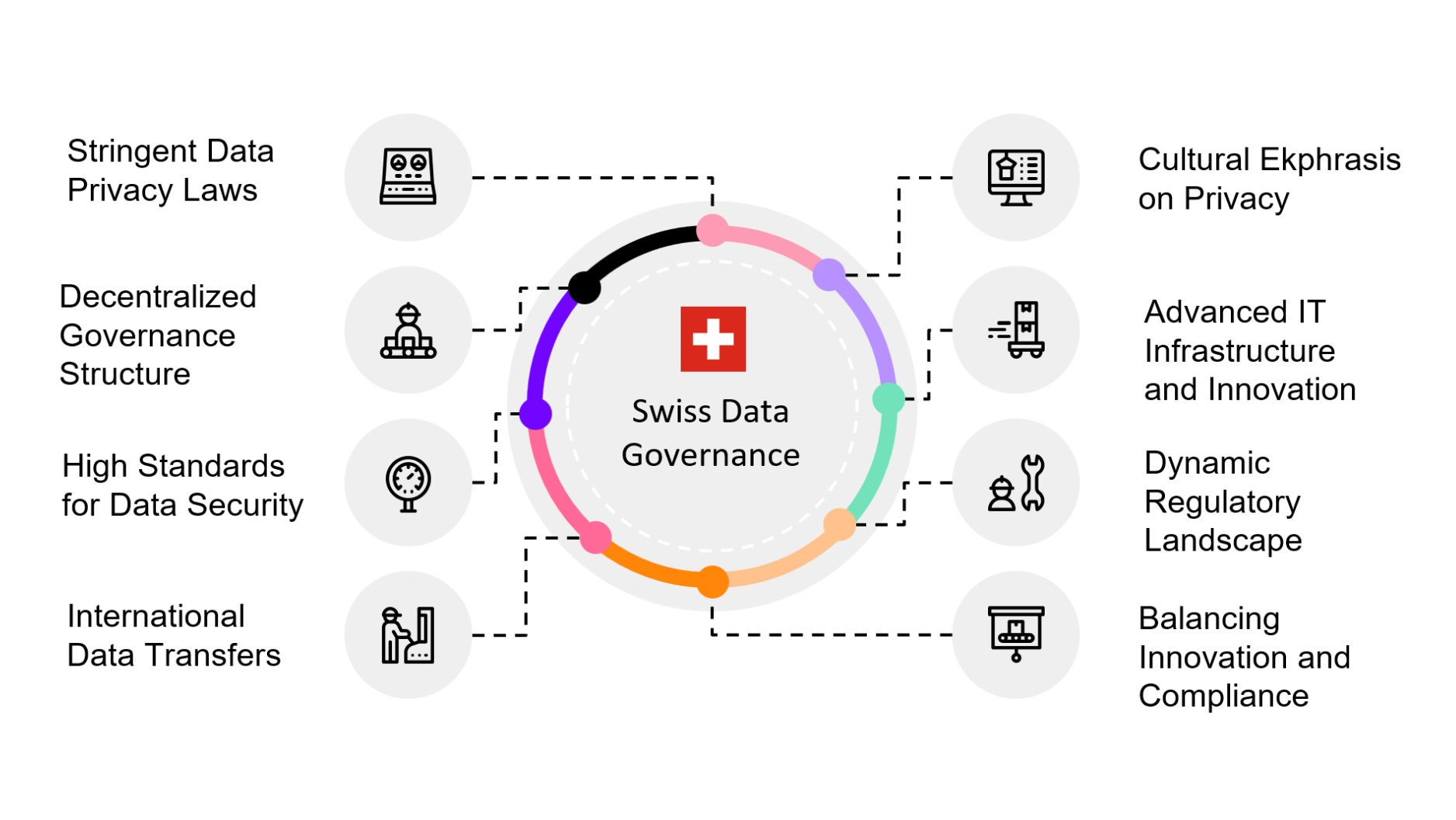
Data governance in Switzerland: Navigating a unique landscape
Data governance in Switzerland is a unique blend of stringent privacy laws, a decentralised regulatory framework, high security standards, a cultural emphasis on privacy and an advanced IT infrastructure. "The distinctive Swiss approach to data governance not only protects personal data, but also fosters an innovative and secure environment in which businesses can thrive," says Dr Dimitrios Marinos, lecturer at the Lucerne University of Applied Sciences and Arts, in his guest article.
Shortcuts:
Intro | Data privacy laws | Decentralised governance structure | Data security standards | International data transfers | Cultural emphasis on privacy | IT infrastructure and innovation | Dynamic regulatory landscape | Balancing innovation and compliance | Info-Events | Programme Information | Contact

Dr Dimitrios Marinos, our lecturer at HSLU, has deep expertise in artificial intelligence, big data analytics, digital transformation, AI ethics, data governance and more.
Switzerland’s approach to data governance is characterised by stringent privacy laws, a decentralised regulatory structure, high security standards, and a strong cultural emphasis on individual rights. This unique environment presents both challenges and opportunities for organisations operating in the country.
In this blog, we explore the key elements that define Swiss data governance, from the Federal Act on Data Protection (FADP) and its alignment with the EU’s GDPR to the dynamic regulatory landscape and the balance between innovation and compliance. Together, these factors create a robust and forward-thinking framework for data management in Switzerland.

Stringent data privacy laws
The foundation of Swiss data governance lies in the country’s rigorous data privacy legislation. The Federal Act on Data Protection (“FADP”) is the cornerstone of these efforts. Recently revised in September 2023, the FADP is closely aligned with the European Union’s General Data Protection Regulation (GDPR), ensuring that Swiss data protection standards are among the highest in the world. This revised act strengthens the rights of data subjects and imposes stricter requirements on data controllers and processors. It mandates transparency in data handling, robust security measures and lawful processing practices.
One of the significant aspects of the FADP is its emphasis on the rights of individuals. Data subjects have extensive rights, including the right to access, rectify and erase their data. These rights give individuals greater control over their personal data and reflect Switzerland’s commitment to protecting personal data.
Decentralised governance structure
The decentralised governance structure requires organisations to be diligent and proactive in their compliance efforts. They must stay abreast of the specific regulations in each jurisdiction in which they operate and ensure that their data protection practices are aligned with these local laws. This approach not only ensures compliance, but also builds trust with local stakeholders.
Switzerland’s federal system adds a layer of complexity to data governance. The country’s 26 cantons each have the authority to implement their own data protection regulations and maintain their own data protection authorities. This decentralisation means that organisations must navigate both federal and cantonal laws to ensure compliance across multiple jurisdictions. This requires a tailored approach to data governance, where organisations must carefully manage and align their practices to meet different regional requirements.
High standards for data security
Swiss data governance is also characterised by high standards of data security. The country is renowned for its rigorous security measures, which often exceed those of many other countries. These measures include mandatory encryption, secure data storage solutions and stringent access controls to protect against unauthorised data breaches and cyber-attacks.
The focus on data security is designed to protect sensitive information and maintain the integrity and confidentiality of personal data. Organisations must implement robust technical and organisational measures to ensure the security of the data they process. This includes regular risk assessments, the implementation of security policies and continuous monitoring to detect and respond to potential threats.
International data transfers
Navigating international data transfers is another critical aspect of data governance in Switzerland. The country is considered a third country by the EU for data protection purposes, but has been granted adequacy status by the European Commission. This status allows data to flow between the EU and Switzerland without additional safeguards, facilitating international operations. However, organisations must still ensure compliance with specific requirements for international data transfers, including adequate protection of data and respect for the rights of data subjects.
Adequacy status attests to Switzerland’s high data protection standards, which are considered equivalent to those of the EU. This status is a competitive advantage for Swiss companies, making it easier for them to engage in international data transfers. However, organisations must remain vigilant and ensure that they comply with all relevant regulations to maintain the integrity and security of data during international transfers.
Cultural emphasis on privacy
A deep cultural emphasis on privacy and confidentiality also characterises Swiss data governance. This respect for privacy is deeply rooted in Swiss traditions, such as banking secrecy, which has historically been an important aspect of the country’s identity. This cultural backdrop influences how data governance policies are formulated and enforced. Organisations operating in Switzerland need to be particularly sensitive to public concerns about privacy and data protection, and ensure that their data handling practices are in line with these cultural values.
Swiss culture places a high value on individual privacy, and this is reflected in the country’s approach to data protection. The emphasis on privacy goes beyond legal requirements to include ethical considerations and societal expectations. Organisations need to demonstrate their commitment to respecting privacy and protecting personal data, which helps to build trust with customers and other stakeholders.
Advanced IT infrastructure and innovation
Switzerland’s advanced IT infrastructure and commitment to innovation have a significant impact on its approach to data governance. The country is a leader in areas such as financial technology, biotechnology and pharmaceuticals, which drives sophisticated approaches to data management and protection. This innovative environment encourages the use of advanced analytics and data processing techniques, while maintaining stringent compliance with data privacy laws.
The country’s robust IT infrastructure provides a solid foundation for data-driven innovation. Organisations are leveraging cutting-edge technologies, such as artificial intelligence and machine learning, to enhance their data governance practices. These technologies enable more efficient data processing, improved data quality and enhanced security measures. At the same time, the regulatory framework ensures that innovation does not come at the expense of data protection.
Dynamic regulatory landscape
The regulatory landscape in Switzerland is dynamic and constantly evolving. Compliance with Swiss data protection laws is overseen by the Federal Data Protection and Information Commissioner (FDPIC). The FDPIC provides guidance, conducts investigations and enforces data protection regulations, playing a key role in maintaining high standards of data governance. This proactive regulatory approach addresses emerging data governance challenges such as big data, artificial intelligence, and cross-border data flows.
The Swiss regulatory framework is designed to adapt to these evolving challenges, ensuring that data protection remains robust and up to date. The FDPIC regularly updates its guidelines and recommendations to take account of new developments and emerging risks. Organisations are encouraged to keep abreast of these updates and incorporate them into their data governance practices to ensure ongoing compliance and protection.
Balancing innovation and compliance
One of the key challenges and opportunities in Swiss data governance is balancing innovation and compliance. Switzerland’s leadership in various high-tech industries requires a sophisticated approach to data governance that supports innovation while ensuring data protection. Organisations must adopt advanced data management technologies and practices that comply with strict regulatory requirements. This balance is critical to maintaining Switzerland’s competitive edge in technology and innovation, while maintaining its reputation for rigorous data protection standards.
Organisations must strike a delicate balance between embracing new technologies and complying with regulatory requirements. This means investing in secure and compliant data management solutions, conducting regular risk assessments and fostering a culture of data protection within the organisation. In this way, organisations can drive innovation while maintaining the highest standards of data governance.
Companies that successfully navigate the complexities of Swiss data governance can gain a competitive advantage by building trust with customers and stakeholders, while leveraging cutting-edge technologies to drive growth and innovation. The commitment to high standards of data protection and security will continue to be a hallmark of Switzerland’s approach to data governance, setting a benchmark for others to follow.
We would like to thank Dr Dimitrios Marinos for his dedication and for sharing these valuable insights.
Start your career with the MSc in Applied Information and Data Science now!
Register and join us for a free online Info-Event:
Monday, 9 March 2026 (Online, English)
Monday, 13 April 2026 (Online, German)
Monday, 11 May 2026 (Online, English)
Monday, 8 June 2026 (Online, German)
Programme Info: MSc in Applied Information and Data Science
More Field Reports & Experiences: Professional portraits & study insights
Frequently Asked Questions: FAQ


